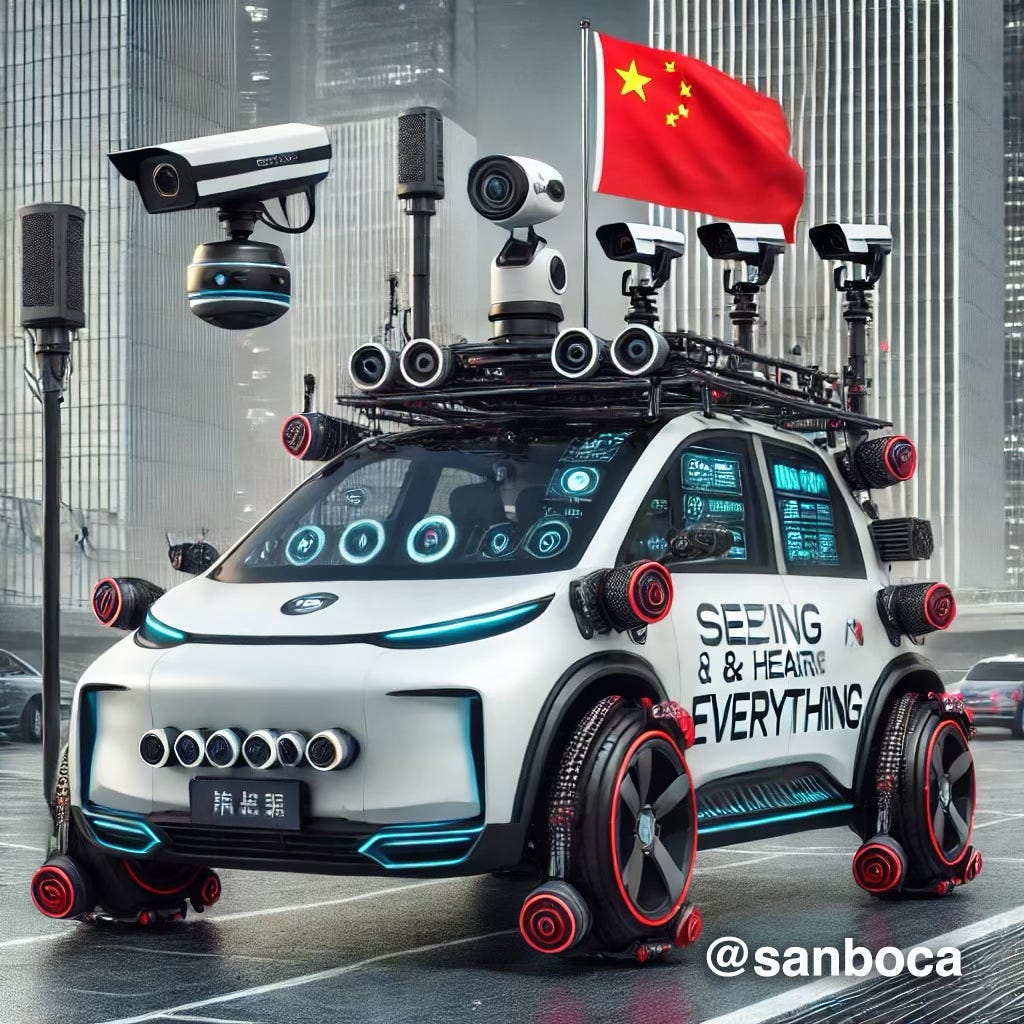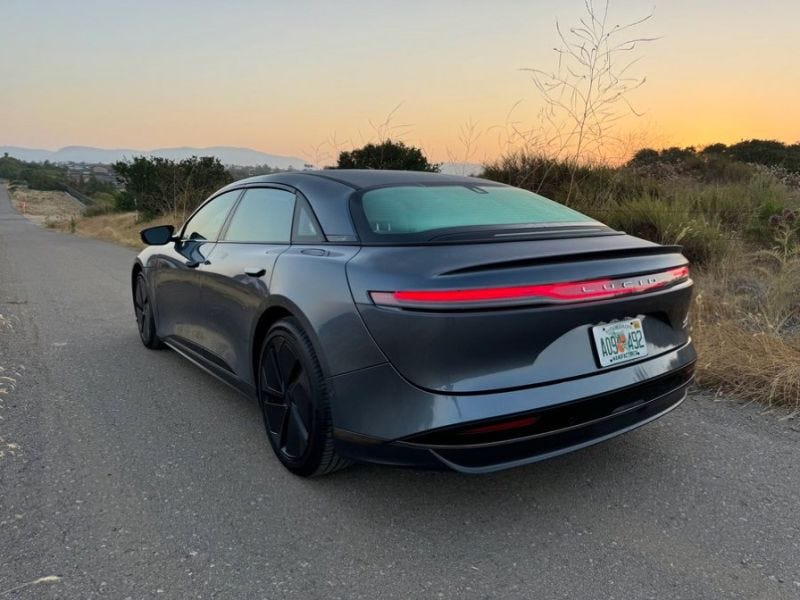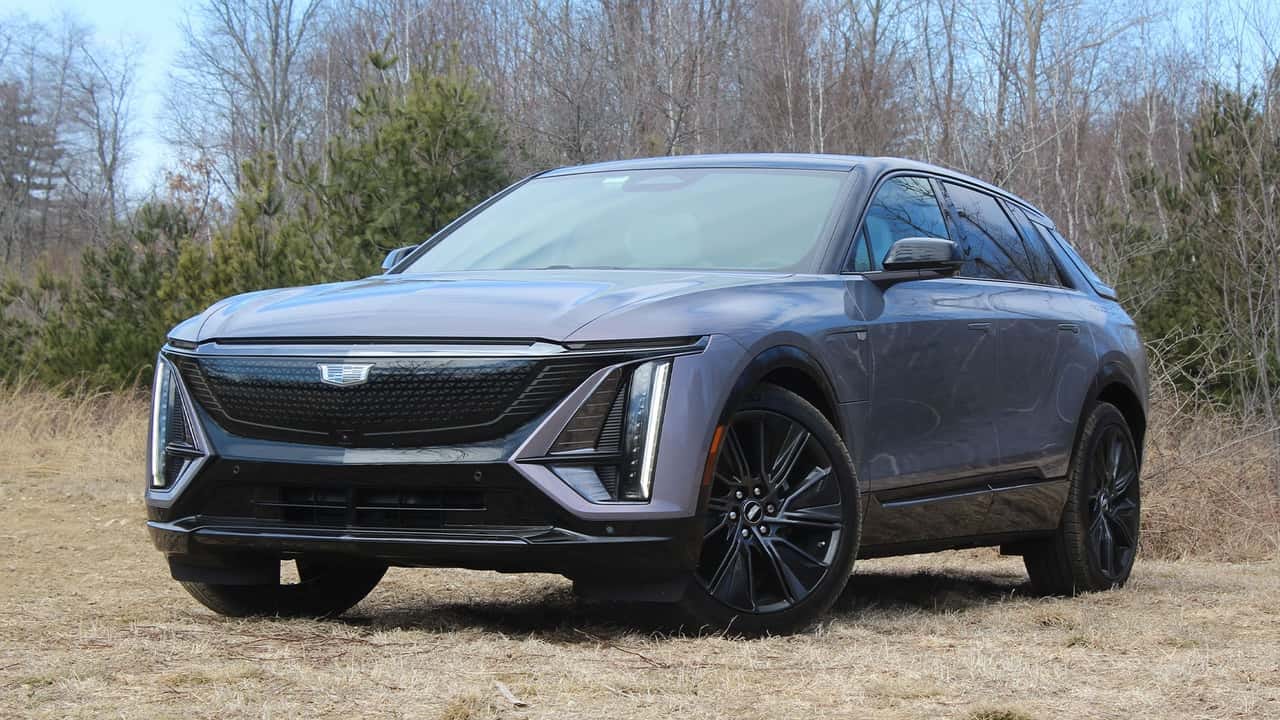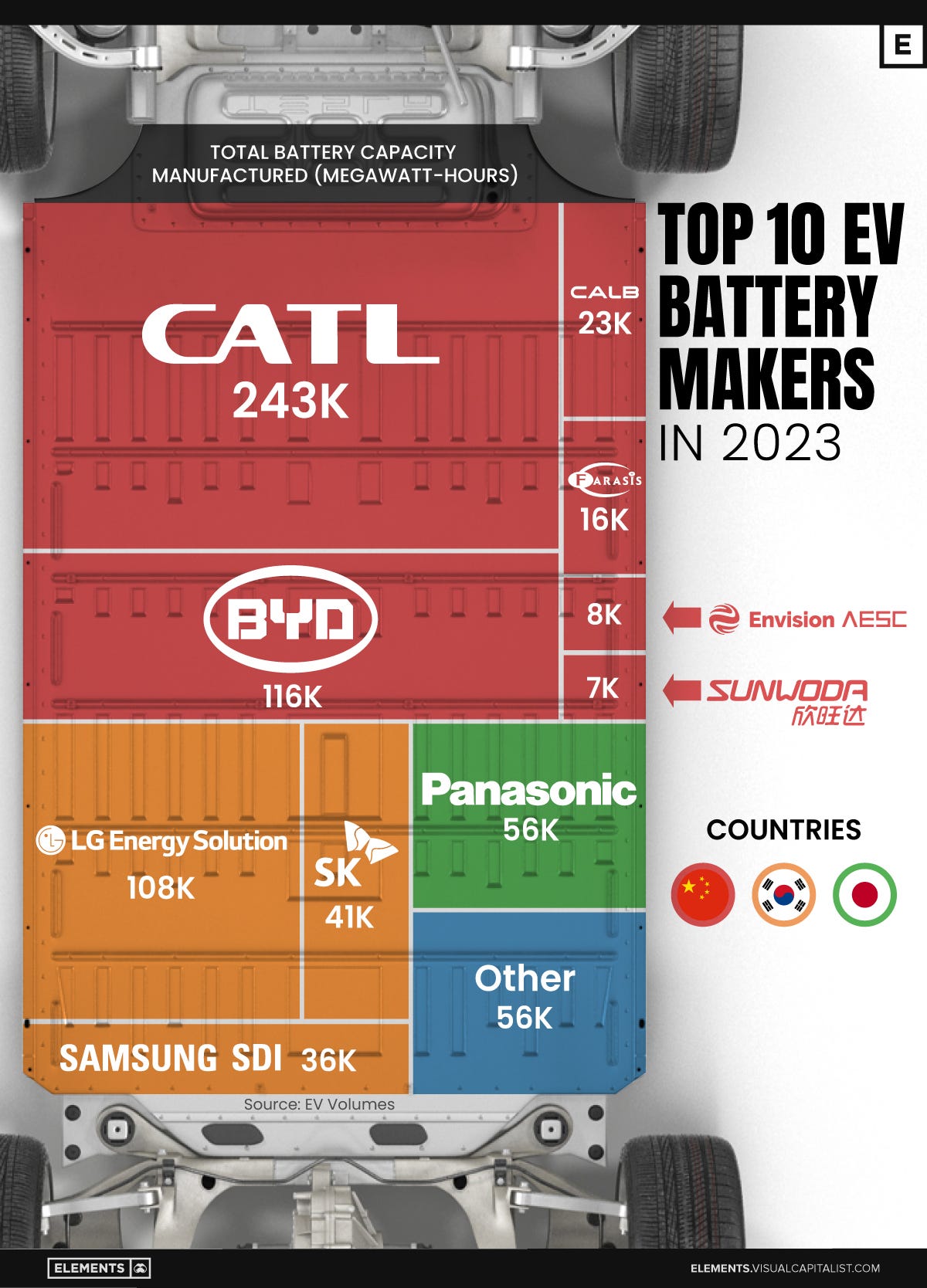Spy Machines
Supercomputers with laser-sharp eyes and ears. AI powers, too.
Spy Machines
That thing parked in your driveway is not a car. It is a supercomputer that travels fast and is equipped with potentially powerful weapons.
Today’s most advanced vehicles give us incredible features - like real time navigation, on-demand entertainment and driver-assist safety systems. Unfortunately, these genius centers can also be turned against us in a split second.
Nine years ago Charlie Miller and Chris Valasek remotely hacked a Jeep Cherokee and demonstrated that they could take control of the vehicle's steering, brakes, and transmission through the Jeep infotainment system.
Today, software-defined vehicles are dramatically more powerful and hackers are infinitely more sophisticated.
"What these cars can do is beyond most people's imagination," says Dan Gittleman, managing partner at Sanboca Insights, a consulting firm with deep expertise in software. "Like a giant vacuum, they suck up images in astonishing detail, refine the intel with AI and send that data over the internet to any place on the planet."
As geopolitical tensions with adversaries like Russia and China escalate, America's leaders in Washington are coming to terms with the potentially devastating risks.
China is now building some of the world's most highly advanced vehicles, powered by high-definition cameras, microphones, AI, and supercomputers.
Modern vehicles require this data for autonomous driving, connectivity and updating of the vehicle’s software and computing systems. The same data, which may be transmitted over the air, can be used for sinister purposes as well.
Here are three ways that an adversary could wreak havoc.
• Covert Surveillance: These mobile devices can act as stealthy spy machines with inward and outward facing cameras that collect data
on the user and the environment around the clock.
• Simultaneous Cyberattacks. An enemy could utilize the car to launch a variety of cyberattacks including distributed denial-of-services (DDoS) that could freeze access to banks, health records or government services. With 100,000 or more Chinese cars on U.S. roads, it would create the computing equivalent of a hyperscale data center within the country. The network would be controlled outside of North America and fully distributed, making it impossible to shut down or disconnect from the rest of the internet.
• Taking Control of Vehicles: Cars could be remotely directed to shut down or speed into intersections, as depicted in the recent Netflix feature, Leave The World Behind. Our shock on 9/11 would be nothing compared to the chaos such an attack would unleash.
Couldn’t the U.S. simply vet cars for spyware before they hit American roads? That is wishful thinking, too. Spy software could easily be delivered later as an over-the-air software update, discreetly blended together with useful bug fixes. Further complicating the picture, a single talented software engineer (with patriotic but malicious intent) could cause havoc even without the knowledge of the company's leadership.
In 2023, Chinese autonomous vehicle companies like Baidu, AutoX and WeRide deployed 50 test vehicles on California roads, recording tens of thousands of driving miles. Brad Templeton, a former executive at Waymo, said that a fleet of robotaxis “could be a potent weapon,” used to crash into people in the event of a conflict. Link
The U.S. Commerce Department announced this week plans to impose limits on some software made in China.
"It doesn’t take a lot of imagination to figure out how a foreign adversary like China...could use [intelligence from cars] to pose a serious risk to our national security and the privacy of U.S. citizens,’’ Commerce Secretary Gina Raimondo told reporters.
If you think this dark picture of the future feels like overwrought American paranoia, consider how the Chinese government itself treats America's most advanced car company, Tesla.
Three years ago, China announced that all Teslas were banned from entering any Chinese military base and places where the country's top leaders convene. Then in 2023, that off-limits designation was extended to many government buildings, exhibition centers, airports and even some highways across the country.
Clearly, Chinese leaders are being vigilant because they recognize that Tesla could be collecting data sensitive to national security.
Think back for a moment to the Cold War era. Imagine the Soviet Union telling the U.S., “We’d like to collect high-resolution real-time imagery of your city streets and buildings. We’d also like to track millions of your citizens to find out where they live, where they travel, what media they consume, who they call, and what they look like. We’ll be nice and not send the data back home – unless we decide we need it. Are you cool with that?”
"Never!" America would have thundered.
Today, we confront unprecedented levels of incursion into our private lives and threats to national security. Americans are now wrestling with how to handle TikTok. Today's highly advanced vehicles make TikTok look like a harmless toy. These mobile spy machines present a trifecta of danger: to our privacy, our safety and our security.
In The Art of War, Sun Tzu encourages his generals to secure "local spies" to provide information about the adversary prior to a battle. Millions of Americans driving Chinese cars across the nation could be the unwitting local superspies and launch pads — hiding in plain sight.
That thing in your driveway might look like a car. But – have no illusions – it's a beast.
• • •
Note: A previous version this opinion piece was published by Automotive News on July 12, 2024 and is reprinted here with permission.
Future Cars & Markets
Electrics
Lucid Air. Earlier this month, I had the opportunity to get behind the wheel of a Lucid Air. It is the most impressive sedan I have driven in memory. The vehicle handled beautifully and seemed to get even better when I moved to higher speeds. I own a Model S and love the vehicle. But the Lucid is a step up when it comes to being smooth and quiet and spacious. Where Tesla still enjoys an edge is in the software department. The Tesla infotainment system and app remain the most intuitive in the industry. When it comes to overall efficiency, the 2025 Lucid Air Pure will be No. 1 in the industry. Link
Lotus Evija X Crash at Goodwood. What happens when you blend a powerful new Lotus EV with advanced software and a driver that is still getting acquainted? The Lotus Evija X crashed just seconds from the starting line. Driver and software teams are now arguing over who is at fault. Video
GM’s 2025 EV Goal. CEO Mary Barra says that GM will not reach the target of selling 1 million EVs by 2025. “We won’t get to a million just because the market is not developing. But it will get there.” Link
Batteries / Supply Chains
The China Battery Show. Visual Capitalist does an outstanding job of letting a picture say a thousand words. This one shows China’s utter dominance when it comes to batteries. Note that Northeast Asia - China, Japan and Korea - account for almost 100% of the world’s battery manufacturing. Of the top 10, six are Chinese, three are Korean and one is Japanese. Link
Advanced Technologies
China Robotaxis. Chinese companies have earned a reputation for being very good at commercializing new technologies. Now, robotaxis are being deployed and consumers are paying for rides in major cities like Beijing, Shanghai and Guangzhou. But making a profit is still proving elusive. Link
New Numbers / Milestones
China’s Export Leaders. China is on track to export 6 million vehicles this year, up from just 1 million in 2020. The top three car exporters - Chery, SAIC and Changan - are all state-owned enterprises. Chery alone exported more than 500,000 vehicles in the first half of 2024. Link
GM Crashing Out in China. GM sales in the Middle Kingdom dropped 29% in Q2 2024. Buick fell by 40%. Chevy tanked 80%. For how much longer will GM stay in China is not a preposterous question anymore. Link
VinFast Expands Into Indonesia. This week VinFast broke ground on a new plant in Subang, West Java. Link
The Piëch GT: A Maximum Emotion Electric Sports Car
Toni Piëch, Founder and Tobias Moers, CEO, Piëch Automotive
Listen to the Driving With Dunne podcast via Apple, Spotify, Amazon or wherever you take your podcasts.
The Dunne Insights Newsletter: Future. Electrics. Global.
Follow Dunne Insights on Twitter, LinkedIn and YouTube.
Visit: www.dunneinsights.com










I've been noodling a contrarian view of the "be afraid of China cars" meta narrative. What if in the process of dominating the car businesses the Chinese end up so transforming the machine itself that it is no longer the industrial engine it was in the days of Henry Ford and Alfred Sloan? What if it becomes a generic "handset," with little emotional appeal or inherent value? What if it is sold on Amazon and Temu rather than a physical dealership? What if it becomes a throwaway commodity unworthy of government support or emotional investment by customers? I don't disagree with the article (love the image!), and the fear of Chinese spying is real. It's just fun to imagine a different outcome, one in which Chinese total victory is a pyrrhic victory nonetheless.
The China stuff is way overwrought paranoia. Have worked with autonomous vehicle company and know exactly what kind of data they collect and do not collect and do not store. Hint, the vast majority of it is publicly available data and not sensitive infrastructure or other data and very little of it is actually retained. The cybersecurity side is also overwrought. There are a lot of efforts on this front, and securing the control systems of AVs has long been an issue and focus of companies building these systems. Data localization and other data related security measures tend to work when properly implemented. The idea that the Chinese government would want to use a Chinese EV for nefarious purposes and would choose to do target someone in an EV is frankly silly. Governments do not undermine their leading technology companies lightly in my experience. And companies are well aware of the issues are AVs and sensors and there are many ways to deal with the basic cybersecurity threats, as with any connected device. But i get it, fear sells, and fear of China, sells even more.